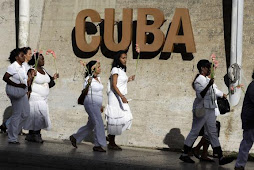Cuba's Problems Can't Be Solved Without Its Exiles / 14ymedio, Eliécer Ávila
Posted on August 9, 2015
14ymedio, Eliécer Ávila, Havana, 5 August 2015 — The Cuban National
Conference, which will take place in Puerto Rico from August 12th until
the 15th, is generating expectations and controversies. Since its dates
coincide with the reopening ceremony of the American embassy in Havana
and the visit to Cuba of Secretary of State John Kerry, it poses a
challenge for leaders of Cuban civil society who are debating whether to
be in San Juan during those days, or to witness the historical moment
from within the island.
Guillermo Toledo, a lawyer by trade, and one of the event's
coordinators, explains the summit's objectives and its significance.
Eliécer Ávila: How did the idea of a Cuban National Conference come about?
Guillermo Toledo: Around two years ago I submitted a proposal in writing
to the leadership of United Cubans of Puerto Rico so they could analyze
it and give me a response. A few months passed, and my proposal was
still going nowhere. So I started insisting. I was then designated
coordinator of the Cuban National Conference, the name we settled on
after several meetings.
Ávila: Who worked to make it happen?
Guillermo Toledo: Together with the members of United Cubans of Puerto
Rico, our Puerto Rican sisters and brothers have contributed their
talents and hard work to this endeavor. Our Cuban sisters and brothers
have also opened their wallets in order to make an event of this
magnitude a reality. These are the same people who in a future free and
democratic Cuba will help with their investments to further the material
development of our people. Our profound gratitude to all of them.
Ávila: Have other gatherings like this taken place before?
Guillermo Toledo: Cuban Exiles have held some great events, but as far
as I know there hasn't ever been a meeting with the character and nature
of the Cuban National Conference. I don't know of any other event that
brought together so many organizations and pro-democracy activists from
inside and outside of Cuba, regardless of their beliefs.
Ávila: Who will be participating?
Guillermo Toledo: Our leadership has decided not to name names until we
get closer to the event. The central figures of the democratic
opposition from inside and outside Cuba will be there, although there
are a lot of people we couldn't invite for lack of funds. I don't like
political labels, but I can say that we've invited the democratic
center, the democratic right, and the democratic left.
Ávila: Regardless of their position regarding the reestablishment of
relations between Cuba and the United States?
Guillermo Toledo: It doesn't matter if they're in favor or against the
policies towards Cuba of the President of the United States, Barack
Obama. This can't and shouldn't be for us a new source of division. If
we're going to be a democratic people, we should respect everyone's
opinions. That's our meeting's golden rule.
Ávila: What are the event's objectives?
Guillermo Toledo: Reaching a consensus on unity of action in diversity,
through the appropriate mechanism to lead us to a free, prosperous,
fair, and democratic Cuba. We'll also be conducting workshops focused on
identifying strategies, tactics, and peaceful methods that will help us
reach our shared objective. We want to send a message of unity to the
Cuban people and the international community.
Ávila: Why choose Puerto Rico as the location for this meeting?
Guillermo Toledo: Both peoples share a common historical bond. The Cuban
Revolutionary Party founded by José Martí had a division dedicated to
helping Puerto Rico gain its independence from Spain. It's also about
being in a neutral place, where the understandable passions of exiles
residing in Miami aren't vented so strongly. We also don't want State
Security, or "Castro's Gestapo," operating in Puerto Rico as it does in
Miami, working as hard here to sow internal divisions as it does there.
Ávila: Will Cuban émigrés play a major role in Cuba's shift towards
democracy?
Guillermo Toledo: Cuba's independence could never have come about
without the support of émigrés and exiles. The War of 1895 [Cuba's
second and final war of independence] had its roots in the key role José
Martí played outside of Cuba, although all the actual battles took place
on the island. Both shores played a decisive role when Spanish despotic
colonialism came to an end. Nowadays we're trying to do away with a
totalitarian dictatorship. Cuba's problems can't be solved without its
exiles.
Ávila: Once it was known that the date for your gathering in Puerto Rico
would coincide with the reopening of the United States embassy in Cuba,
and given the historical importance of the latter, have you thought
about moving the date?
Guillermo Toledo: United Cubans of Puerto Rico chose August 13th, 14th,
and 15th of the current year, long before December 17, 2014, when the
new United States policy towards Cuba was made public. Maybe we should
ask the Americans if it's just coincidence that they chose August 14th
to hold the events at their embassy.
Our gathering can't be cancelled or postponed because the international
community is already aware of it, and the financial losses would be
enormous. We also don't believe there's a valid reason to postpone it
since our meeting is a thoroughly Cuban event where we'll be discussing
and reaching agreements regarding Cuba. The embassy is an American
matter, as it should be.
Ávila: Do you have a dream that still hasn't come true?
Guillermo Toledo: To return to Cuba in a dignified manner, and help
create a new country where its people can enjoy freedom, and material
and spiritual development.
Translated by José Badué
Source: Cuba's Problems Can't Be Solved Without Its Exiles / 14ymedio,
Eliécer Ávila | Translating Cuba -
http://translatingcuba.com/cubas-problems-cant-be-solved-without-its-exiles-14ymedio-eliecer-avila/
Subscribe to:
Post Comments (Atom)





No comments:
Post a Comment